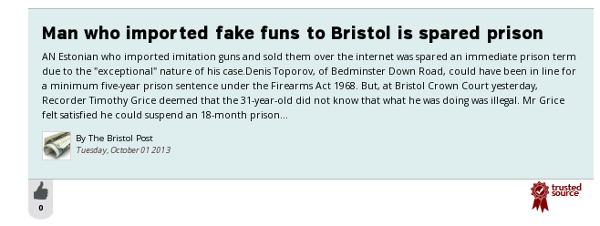My attention was drawn today to a curious article on the Local Government Association website from Bristol City Council.
To me it’s reminiscent of a livestock dealer crowing about the fine qualities of the beast he’s trying to sell or perhaps even a prostitute buttering up a prospective client.
There are some fine examples of jargon too.
However, this article gives me cause for concern on three counts.
Firstly, I’m paying the wages of the council’s planning wonks directly through my council tax (and indirectly through your national taxes, a portion of which gets returned to local authorities by way of government grant. Ed.), but it seems like they’re not working for the benefit of the city’s residents, but the planners seem rather concerned with working for the benefit of property developers.
This leads on to my second concern: those chummy quarterly chats with the Bristol Property Agents Association (BPAA), a cosy club whose membership is drawn from primarily from local residential and commercial property agents, as well as commercial property lawyers, developers, architects, planners, building and quantity surveyors.
Finally, there’s the offer to renegotiate Section 106 agreements. These are planning obligations under Section 106 of the Town and Country Planning Act 1990 (as amended) and are a mechanism which make a development proposal acceptable in planning terms, that would not otherwise be acceptable. They are focused on site specific mitigation of the impact of development. S.106 agreements are often referred to as ‘developer contributions’ along with highway contributions and the Community Infrastructure Levy.
For a cash-strapped council, I would have thought that its priority should be squeezing as much from developers under S.106 as it can.
Evidently not.
The example of Finzels [sic] Reach given in the article is interesting. After being granted planning permission, the developers renegotiated their S.106 obligations and still went into administration last year. Perhaps their scheme was so poorly planned and financed, it should not have been given planning permission in the first place.
The article – dated 8th October 2013 – is reproduced in full below.
Bristol City Council: open for business on Section 106 agreements
Bristol City Council has an ‘open for business’ policy in relation to bringing forward development and investment in the city. Last year the Council received just over 3,000 planning applications, saying ‘yes’ to over 80 per cent of these (89 per cent of major schemes).
The council meets representatives of the Bristol Property Agents Association (BPAA) on a quarterly basis in order to discuss live issues, including delivery of development. The West of England Planning Toolkit and the Bristol Planning Protocol were jointly produced with representatives from the development sector.
Bristol has a good record of housing delivery. Its adopted Core Strategy target is for a minimum of 26,400 dwellings to be delivered between 2006 and 2026, and in the six years since 2006 over 12,700 (approximately 48 per cent) of these dwellings have been constructed. In addition, there are around 7,000 residential units currently with planning consent in the city – a significant proportion of which are yet to be commenced. In order to ensure this much needed development is brought forward, Bristol proactively seeks requests from developers to renegotiate Section 106 agreements on schemes that have become unviable since planning consent was granted. Requests are considered by the planning committee in a process that includes an open book appraisal of viability by the developer.
Outcome and impact
This approach is proving successful. Examples include Finzels Reach (a £200 million mixed-use development site in central Bristol), which is a high quality regeneration scheme on a strategically important site.
Within this context, Bristol negotiated a revised Section 106 package that met some, although not all, of the demands put forward by the developer. The revised position incentivised the developer to deliver the development to their timescale by reducing the Section 106 package by around a third (£4.5 million) if various triggers were reached.
Contact
Kate Hartas
Media and PR officer
Telephone: 0117 922 2649
Since I drew attention to the article, I’ve received the tweet shown below from Bristol City Council.

On the basis of that tweet, I have a couple of questions for Bristol City Council’s press office.
1. If Bristol City Council describes a press release bearing this month’s date as ‘ancient’, what counts as modern?
2. If that press release was released in error as you seem to be implying, is any quality control exercised by your officers before material is released for publication?
Answers will be accepted in the comments below.
Update 23/10/13: The following message has been received this morning from Bristol City Council.
Hi Steve
I’ve tried to leave a comment on your blog but get a message saying we’re blocked, probably because our work computers are behind a proxy.
In answer to your questions though, the press release you’re referring to was sent out in Sept 2012, hence our description of it as ‘pretty ancient’. The website it was published on is not in our control but that of the LGA, which recently did technical amendments to the page (not the release) which updated the automatic date shown on their site. After your tweet we drew this to their attention and asked them to remove it as it was old news and could be confusing given the apparent date. The original press release was not an error, it was sent deliberately in Sept 2012. What we can’t control is who posts it where and for how long after.
I hope this clears it up for you.
Kind regards
Tim
Tim Borrett
Service Manager, Media
Bristol City Council
Thanks Tim. That helps explain the ancient nature of the press release (which you might like to know the LGA’s webmaster still hasn’t taken down. Ed.), but not the matter of why the council’s planning department seems to be working more in the interests of property developers and not for the people of Bristol who pay their wages.









